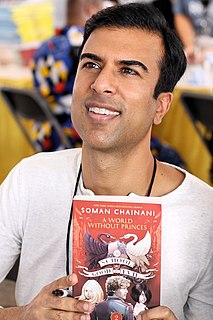A Quote by Jean Craighead George
Children will often write, 'We love your books because there are no adults in them.'
Related Quotes
I never think of my work as writing for a young audience, frankly, because I think it risks talking 'down' to them. The idea is for these books to work just as well as for adults as kids. As for what readers will take away, I just want them to love being in the world and see it as a safe place to explore things that adults are often uncomfortable talking to them about.
Of course all children's literature is not fantastic, so all fantastic books need not be children's books. It is still possible, even in an age so ferociously anti-romantic as our own, to write fantastic stories for adults: though you will usually need to have made a name in some more fashionable kind of literature before anyone will publish them.
The one concession I've made as I've gotten older is that my children are now adults and they're in their twenties and thirties and so I'm careful about how I write about them. I may write about them as a child, but I'm not going to write about their current struggles because they're adults and they can do it for themselves. I want to give them some space in a way I didn't when they were younger.
Do you think you love your children better than He who made them? Is not your love what it is because He put it into your heart first? Have you not often been cross with them? Sometimes unjust to them? Whence came the returning love that rose from unknown depths in your being, and swept away the anger and the injustice? You did not create that love. Probably you were not good enough to send for it by prayer. But it came. God sent it. He makes you love your children.
Making fiction for children, making books for children, isn't something you do for money. It's something you do because what children read and learn and see and take in changes them and forms them, and they make the future. They make the world we're going to wind up in, the world that will be here when we're gone. Which sounds preachy (and is more than you need for a quotebyte) but it's true. I want to tell kids important things, and I want them to love stories and love reading and love finding things out. I want them to be brave and wise. So I write for them.
I wish that the adults who are 'in power' cared more about what their children read. Books are incredibly powerful when we are young - the books I read as a child have stayed with me my entire life - and yet, the people who write about books, for the most part, completely ignore children's literature.
Although adults have a role to play in teaching social skills to children, it is often best that they play it unobtrusively. In particular, adults must guard against embarrassing unskilled children by correcting them too publicly and against labeling children as shy in ways that may lead the children to see themselves in just that way.
The young adult literature is relatively new - it just kind of exploded in the 2000s. When I grew up, there weren't bookstores with sections dedicated to teen lit, nor was my generation raised reading books written specifically for us. Because of that, today we still think of books for teens as children's books and so when you write a book that includes sensitive topics, it just seems even more controversial. What's troubling to me about that is these are issues adults know that teens deal with. Not writing about them makes them something we don't, or can't talk about.





































